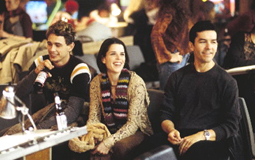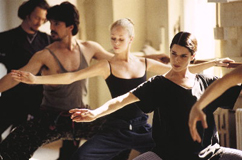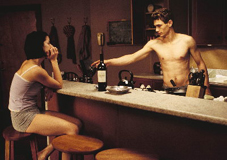The Company (Robert Altman, 2003)
 The uncontestable highlight of Robert
Altman’s superlative ballet film The
Company is an enchanting pas de deux that quickly becomes something of a
rain dance when the stormy skies above begin to threaten the performance in an
outside amphitheater. It’s a beautiful moment that becomes transcendent, and
then continues to expand as the director shows us the crowd’s reaction and the
reaction of the artistic director, who frantically wonders whether the floor is
dry and the dancers are at risk. It’s one of Altman’s finest scenes, but it
almost seems simplistic, at least until you realize no one else would stage the
scene in such an attentive and expansive way. Though none of the other dance
numbers quite reach that height, they are all are successful. From the opening
dance with its parade of ribbons to the closing fairy tale ballet, each is shot
and edited to present the body as an expressive object. They are only hampered
at all by the sad choice to shoot the film on DV. This decision results in a
regrettable smoky look that’s probably not intended. Chicago, though a far
less impressive example of filmmaking, had a better use of black spaces during
its musical numbers, since it was able to actually show a truly black space by
virtue of it being shot on film. When Altman tries for the same effect, it fails
somewhat because the backdrop is too bright. Otherwise, whenever the director
shoots, he scores.
The uncontestable highlight of Robert
Altman’s superlative ballet film The
Company is an enchanting pas de deux that quickly becomes something of a
rain dance when the stormy skies above begin to threaten the performance in an
outside amphitheater. It’s a beautiful moment that becomes transcendent, and
then continues to expand as the director shows us the crowd’s reaction and the
reaction of the artistic director, who frantically wonders whether the floor is
dry and the dancers are at risk. It’s one of Altman’s finest scenes, but it
almost seems simplistic, at least until you realize no one else would stage the
scene in such an attentive and expansive way. Though none of the other dance
numbers quite reach that height, they are all are successful. From the opening
dance with its parade of ribbons to the closing fairy tale ballet, each is shot
and edited to present the body as an expressive object. They are only hampered
at all by the sad choice to shoot the film on DV. This decision results in a
regrettable smoky look that’s probably not intended. Chicago, though a far
less impressive example of filmmaking, had a better use of black spaces during
its musical numbers, since it was able to actually show a truly black space by
virtue of it being shot on film. When Altman tries for the same effect, it fails
somewhat because the backdrop is too bright. Otherwise, whenever the director
shoots, he scores.
 One of the most surprising things about The Company, which perhaps shouldn’t be surprising given its
director’s body of work, is that it essentially eschews the backstage
drama’s central cliché and resists becoming the story of a prima donna’s
rise to fame. As the title suggests, the company as a whole is the subject here,
and while Neve Campbell’s future star Ry has a central role, she hardly
dominates the film. Just as interesting, for example, is 43-year-old dancer
Deborah, who wears her time with the company like a badge of honor. The drama
comes not from any individual’s travails, but from the day-in, day-out
problems that afflict the company as a whole. With the distance that Altman’s
encompassing point of view provides, a snapped Achilles tendon becomes a small
personal disaster, but one that the company expeditiously copes with. It
intelligently makes us understand the work involved in the dancer’s quest in
“becoming the movement”, but never expects us to fawn over these people for
doing their job. We see the company alternatively, and sometimes simultaneously,
as a critical and supportive environment, where tough love is dispensed so
frequently that no one can forget the reality of the situation. It makes sense
though, since Altman takes time to point out the economic decisions that
influence the troupe’s output (as well as the financial instability of the
dancers themselves), making it clear that reality is always threatening to rear
its head and interrupt the creative process.
One of the most surprising things about The Company, which perhaps shouldn’t be surprising given its
director’s body of work, is that it essentially eschews the backstage
drama’s central cliché and resists becoming the story of a prima donna’s
rise to fame. As the title suggests, the company as a whole is the subject here,
and while Neve Campbell’s future star Ry has a central role, she hardly
dominates the film. Just as interesting, for example, is 43-year-old dancer
Deborah, who wears her time with the company like a badge of honor. The drama
comes not from any individual’s travails, but from the day-in, day-out
problems that afflict the company as a whole. With the distance that Altman’s
encompassing point of view provides, a snapped Achilles tendon becomes a small
personal disaster, but one that the company expeditiously copes with. It
intelligently makes us understand the work involved in the dancer’s quest in
“becoming the movement”, but never expects us to fawn over these people for
doing their job. We see the company alternatively, and sometimes simultaneously,
as a critical and supportive environment, where tough love is dispensed so
frequently that no one can forget the reality of the situation. It makes sense
though, since Altman takes time to point out the economic decisions that
influence the troupe’s output (as well as the financial instability of the
dancers themselves), making it clear that reality is always threatening to rear
its head and interrupt the creative process.
 It’s difficult not to read a film that
so strongly stresses the amount of work that goes into the presentation of the
seemingly effortless as a summation of Altman’s body of work, especially
when the collection of an ensemble of talent seems so key to making the magic
happen. Fortunately, the ensemble that Altman has assembled for The Company can stand alongside that in any of his other films.
Malcolm McDowell’s marvelously hammed up performance as the troupe’s
artistic director, perhaps appropriately lords over the other actors whenever
he’s on screen. Even when he says, “I’m not here,” to a group of
rehearsing dancers, he clearly is felt as a presence, and before long, begins
barking orders. Star and producer Neve Campbell holds her own among a cast
comprised partially of professional dancers. Something of a privileged outsider
among her peers, her character expresses herself as much on the stage as through
a lovely romance, which develops mostly through non-verbal expression. As an
instrumental force in getting this film made, she gives us a too-rare example of
the star-driven Hollywood system creating a project driven by artistry instead
of ego. It’s one of the least vain vanity projects I can recall, since it
allows many of the choicest moments to reside in other actors’ hands.
Particularly of note is Marilyn Dodds Frank as her crass, heavy-drinking mom.
She’s a wonderfully conceived character, and someone you could only expect to
find in an Altman film. The Company is
the director’s best work in a decade.
It’s difficult not to read a film that
so strongly stresses the amount of work that goes into the presentation of the
seemingly effortless as a summation of Altman’s body of work, especially
when the collection of an ensemble of talent seems so key to making the magic
happen. Fortunately, the ensemble that Altman has assembled for The Company can stand alongside that in any of his other films.
Malcolm McDowell’s marvelously hammed up performance as the troupe’s
artistic director, perhaps appropriately lords over the other actors whenever
he’s on screen. Even when he says, “I’m not here,” to a group of
rehearsing dancers, he clearly is felt as a presence, and before long, begins
barking orders. Star and producer Neve Campbell holds her own among a cast
comprised partially of professional dancers. Something of a privileged outsider
among her peers, her character expresses herself as much on the stage as through
a lovely romance, which develops mostly through non-verbal expression. As an
instrumental force in getting this film made, she gives us a too-rare example of
the star-driven Hollywood system creating a project driven by artistry instead
of ego. It’s one of the least vain vanity projects I can recall, since it
allows many of the choicest moments to reside in other actors’ hands.
Particularly of note is Marilyn Dodds Frank as her crass, heavy-drinking mom.
She’s a wonderfully conceived character, and someone you could only expect to
find in an Altman film. The Company is
the director’s best work in a decade.
80
09-16-03
Jeremy Heilman